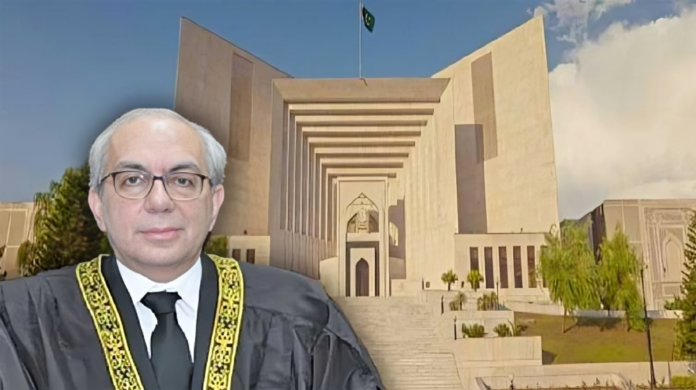Justice Munib Akhtar, who declined to participate in the five-member bench tasked with hearing the Article 63A Review petition, expressed his reservations regarding the proceedings. He stated that a four-member bench, which was chaired by the Chief Justice, could not validly conduct the review of Article 63A in his absence.
His dissent came in a formal letter addressed to the Supreme Court’s registrar, where he questioned the legitimacy of the ongoing review without his presence as part of the original five-member panel.
Justice Munib Akhtar emphasized in his second letter that “Four judges could not have sat and heard the matter that was listed before a 5-member Bench,” reflecting his disapproval of the current composition. The originally constituted bench, led by Chief Justice of Pakistan (CJP) Qazi Faez Isa, included Justice Amin-Ud-Din Khan, Justice Jamal Khan Mandokhail, Justice Mazhar Alam, and Justice Munib Akhtar himself. This panel was responsible for reviewing the petition challenging the Supreme Court’s earlier verdict on the defection clause outlined in Article 63A.
The dissent arose after the Supreme Court adjourned the hearing of the Article 63A Review petition when Justice Munib Akhtar did not attend the session. In his correspondence to the Supreme Court’s registrar, Justice Munib Akhtar clarified that he had not recused himself from the bench but could not partake in a bench that was reconstituted by the Supreme Court’s Practice and Procedure Committee. Justice Munib Akhtar stressed that the review should have adhered to the initial composition of the five-member bench.
During the ongoing session, Justice Munib was notably absent from the bench, leading CJP Isa to adjourn the hearing, expressing that the court would request his return to the bench. Justice Munib Akhtar, however, reiterated his stance in a letter, stating that “What appears to have happened prima facie seems to be a complete departure from all precedent, and applicable law and rules.” He emphasized that the four-judge bench should not have proceeded without the full, originally formed five-member bench, as per the procedural rules.
In his previous communication, Justice Munib Akhtar had also demanded that his letter be included as part of the case record, a request that was denied by CJP Isa, who noted that the judge should have voiced his opinion while participating in the bench discussions. Justice Munib Akhtar argued that the bench’s decision to proceed without him was improper, further adding to the tension surrounding the Article 63A Review case.
The objections raised by Justice Munib Akhtar have introduced significant controversy in the review process. Following his letter, CJP Isa has called for a session of the Supreme Court’s Practice and Procedure Committee to address these procedural concerns. The committee, formed under the Supreme Court Practice and Procedure Amendment Ordinance, has already constituted nine larger benches to hear pending review petitions, including the Article 63A Review, which has been delayed since 2018.
This session, expected to convene soon, may determine how the court will proceed with the Article 63A Review petition and whether Justice Munib Akhtar’s objections will prompt further changes to the bench composition.
Also Read: Supreme Court Powers Restored with 2024 Ordinance Amendments


